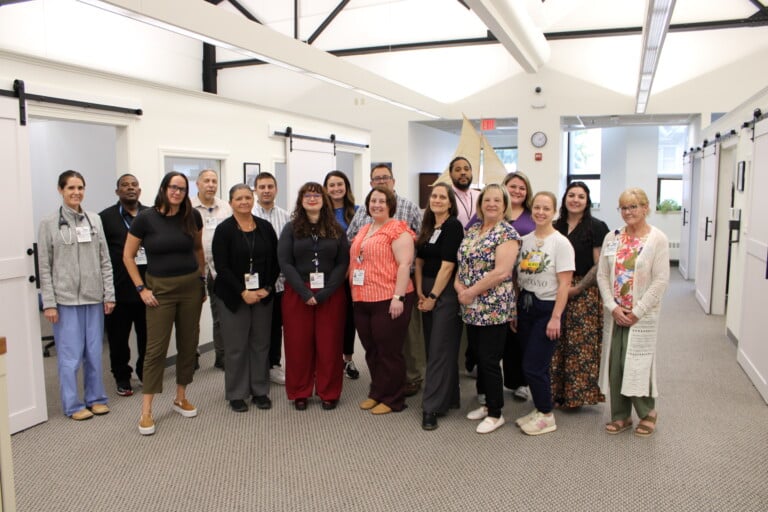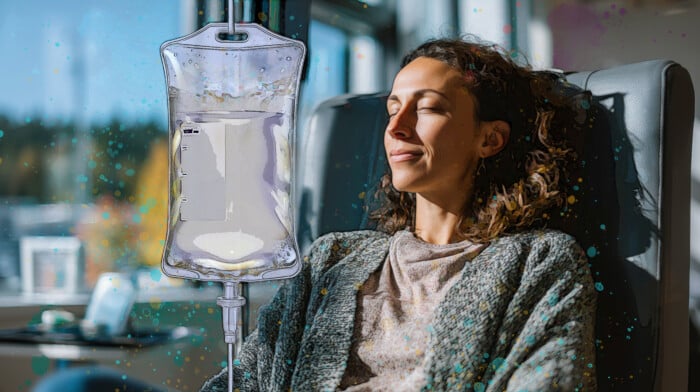The Doorway: Elliot Expands Access to Recovery in Manchester
The Doorway of Greater Manchester, led by Elliot Health System, provides a lifeline for anyone living with substance abuse disorder

When a woman receiving emergency care at Elliot Hospital for methamphetamine use discovered she was pregnant, she didn’t just receive medical care—she found a lifeline. Through The Doorway of Greater Manchester, now led by Elliot Health System, she was connected to prenatal care, substance use disorder (SUD) treatment, and ongoing recovery support, all under one roof.
“Our peer recovery support workers went into the hospital, met with her to ensure she had contacts prior to release, and worked on a plan to get her into treatment before she left,” explained Annette Escalante, Director of Substance Use Services at The Elliot. “She was provided a ride directly from the hospital into treatment, connected with a primary care provider, and received care from an OB/GYN all through The Elliot.”
After treatment, The Doorway team also helped to secure housing for her and her child—an example of the holistic, comprehensive approach to care that defines the program’s recovery services.
What Is The Doorway Program?
Comprised of nine regional hubs, The Doorway is a statewide network coordinated by the New Hampshire Department of Health and Human Services (DHHS) to ensure timely access to screening, evaluation, treatment options, and ongoing recovery support. The Elliot assumed leadership of the Greater Manchester location on July 1, 2025, strengthening the program’s clinical reach and community partnerships. With a team of medical providers, mental health counselors, recovery coaches, and case managers, The Doorway provides a single point of entry for addiction treatment and recovery, reaching more people where they are and inspiring wellness across the community.
No matter what stage someone may be in their journey, The Doorway offers connection to screening and evaluation, treatments including medication-assisted treatment of both opioid and alcohol use disorders, prevention materials including naloxone, supports and services to assist in long-term recovery and peer recovery support services.
Patients can walk in without an appointment, receive an assessment, and immediately access the care they need. “It’s a one-stop shop,” Escalante said. “If we have to send someone somewhere else for an assessment, we risk losing them in the process. Here, they can get everything in one place.”
Meeting Manchester’s Urgent Need
Despite progress, the opioid crisis continues to affect communities across New Hampshire. The city reports that Manchester recorded 527 suspected overdoses in 2024 – 29 of which were fatal. That represents a 24% drop in suspected opioid overdoses and a 36% decrease in overdose deaths compared to 2023 – a sign that intervention, treatment, and outreach are making an impact.
However, the fight is far from over. Manchester Police and the Manchester Health Department recently issued a public alert about a surge in deaths linked to carfentanil, a synthetic opioid that is about 10,000 times stronger than morphine and even more potent than fentanyl. According to the US Drug Enforcement Administration, carfentanil has been increasingly found mixed with other illicit drugs, leading to a rise in overdose deaths and is a chilling reminder of how the opioid epidemic continues to evolve and introduces new threats at an alarming pace.
Data from the New Hampshire State Medical Examiner support this; carfentanil has been linked to 10 deaths statewide so far in 2025, including three in Manchester. In comparison, there were just seven carfentanil-related deaths statewide in all of 2024.
Expanding Recovery Through Community Partnerships
Despite new threats, the decline in overdoses seen in Manchester is widely attributed to a holistic, community-focused approach to care and recovery. By integrating medical treatment, peer recovery support, mental health services, and housing assistance, The Doorway removes barriers and meets people where they are. This comprehensive approach is another example of The Elliot’s commitment to the community.
Building on years of experience at its Center for Recovery Services, The Elliot works closely with local partners—such as area homeless shelters, Manchester Police Department, Families in Transition, and others, to reach people who might otherwise fall through the cracks.
“Nine out of 10 times, we have to bring the services to the client,” Escalante noted. “That’s why partnerships are critical—we can meet people where they are and reduce barriers to care.”
Since its statewide launch in 2019, the Doorway network has connected with over 400 patients per month. The Elliot expects to serve 1,500 individuals annually through the Greater Manchester hub.
A Path Toward Hope
Recovery is not just about treating a disorder; it’s about restoring stability and hope. That’s why The Doorway offers more than treatment; it provides a path forward. Whether it’s a parent seeking a healthier future for their child, or individuals reentering the community after incarceration, The Doorway delivers accessible, compassionate service designed to help people take the first step toward recovery without delay.
Get Help Today
If you or someone you know is struggling with substance use disorder, help is available right now. Call 2-1-1 for immediate support or walk into The Doorway at Elliot’s Center for Recovery Services, at 300 Hanover Street, Manchester, weekdays from 8 a.m. to 5 p.m.













